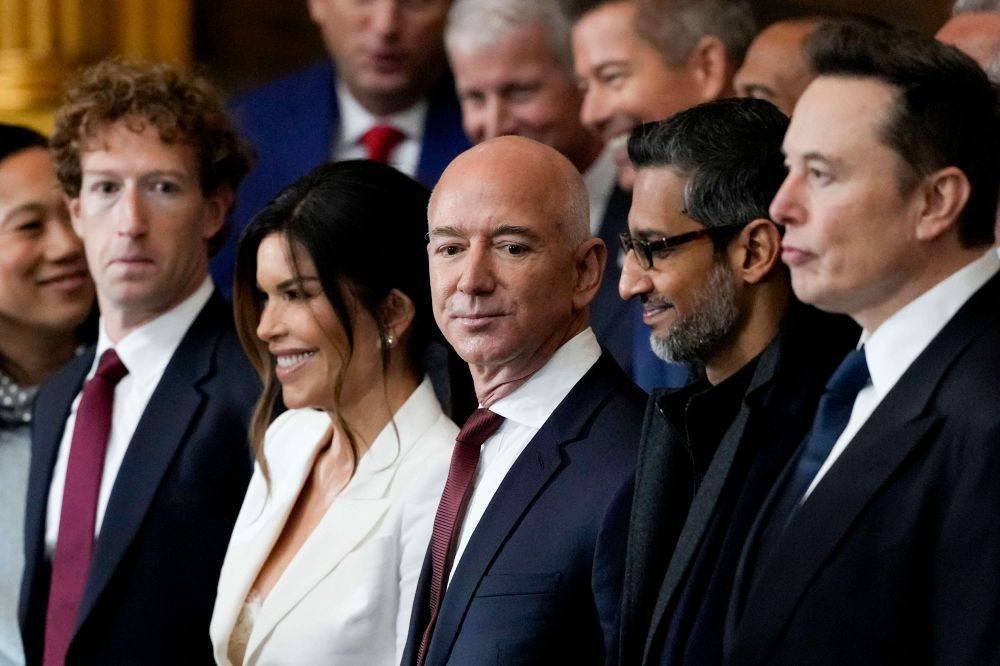The sci-fi fantasy worlds of the broligarchs

I’m only marginally familiar with the various worlds of contemporary science fiction, but all this reads to me like some sort of mash-up Ayn Rand, Gene Roddenberry, Frank Herbert, Nietzsche, and other favorites of dorm room philosophizing, all fueled by A LOT of drugs, specifically testosterone and whatever that stuff Musk doses himself with is.
“It’s a sense of complete impunity — including impunity to the laws of nature,” Brooke Harrington, a professor of economic sociology at Dartmouth who studies the behavior of the ultra-rich, told me. “They reject constraint in all of its forms.” . . .
Zuckerberg’s quest to build the Metaverse, a virtual reality so immersive and compelling that people would want to strap on bulky goggles to interact with each other, is seemingly inspired by the sci-fi author Neal Stephenson. It was actually Stephenson who coined the term “metaverse” in his novel Snow Crash, where characters spend a lot of time interacting in a virtual world of that name. Zuckerberg seems not to have noticed that the book is depicting a dystopia; instead of viewing it as a warning, he’s viewing it as an instruction manual.
Jeff Bezos is inspired by Star Trek, which led him to found a commercial spaceflight venture called Blue Origin, and The High Frontier by physics professor Gerard K. O’Neill, which informs his plan for space colonization (it involves millions of people living in cylindrical tubes). Bezos attended O’Neill’s seminars as an undergraduate at Princeton.
Musk, who wants to colonize Mars to “save” humanity from a dying planet, is inspired by one of the masters of American sci-fi, Isaac Asimov. In his Foundation series, Asimov wrote about a hero who must prevent humanity from being thrown into a long dark age after a massive galactic empire collapses. “The lesson I drew from that is you should try to take the set of actions that are likely to prolong civilization, minimize the probability of a dark age and reduce the length of a dark age if there is one,” Musk said.
And Andreessen, an early web browser developer who now pushes for aggressive progress in AI with very little regulation, is inspired by superhero stories, writing in his 2023 “Techno-Optimist Manifesto” that we should become “technological supermen” whose “Hero’s Journey” involves “conquering dragons, and bringing home the spoils for our community.”
All of these men see themselves as the heroes or protagonists in their own sci-fi saga. And a key part of being a “technological superman” — or ubermensch, as the German philosopher Friedrich Nietzsche would say — is that you’re above the law. Common-sense morality doesn’t apply to you because you’re a superior being on a superior mission. Thiel, it should be noted, is a big Nietzsche fan, though his is an extremely selective reading of the philosopher’s work.
The ubermensch ideology helps explain the broligarchs’ disturbing gender politics. “The ‘bro’ part of broligarch is not incidental to this — it’s built on this idea that not only are these guys superior, they are superior because they’re guys,” Harrington said.
For one thing, they valorize aggression, which is coded as male. Zuckerberg, who credits mixed martial arts and hunting wild boars with helping him rediscover his masculinity (and is sporting the makeover to prove it), recently told Joe Rogan that the corporate world is too “culturally neutered” — it should become a culture that has more “masculine energy” and that “celebrates the aggression.”
Likewise, Andreessen wrote in his manifesto, “We believe in ambition, aggression, persistence, relentlessness — strength.” Musk, meanwhile, has jumped on the testosterone bandwagon, amplifying the idea that only “high T alpha males” are capable of thinking for themselves; he shared a post on X that said, “This is why a Republic of high status males is best for decision making. Democratic, but a democracy only for those who are free to think.”
This idea that most people can’t think for themselves is key to Nietzsche’s idea of the ubermensch. What differentiates the ubermensch, or superman, is that he is not bogged down by common-sense morality (baseless) or by God (dead) — he can determine his own values.
The broligarchs — because they are in 21st-century Silicon Valley and not 19th-century Germany — have updated and melded this idea with transhumanism, the idea that we can and should use technology to alter human biology and proactively evolve our species.
Transhumanism spread in the mid-1900s thanks to its main popularizer, Julian Huxley, an evolutionary biologist and president of the British Eugenics Society. Huxley influenced the contemporary futurist Ray Kurzweil, who predicted that we’re approaching a time when human intelligence can merge with machine intelligence, becoming unbelievably powerful.
And is is so often the case, extreme reactionary misogyny and patriarchy are being repackaged in various forms of gee whiz technology.


